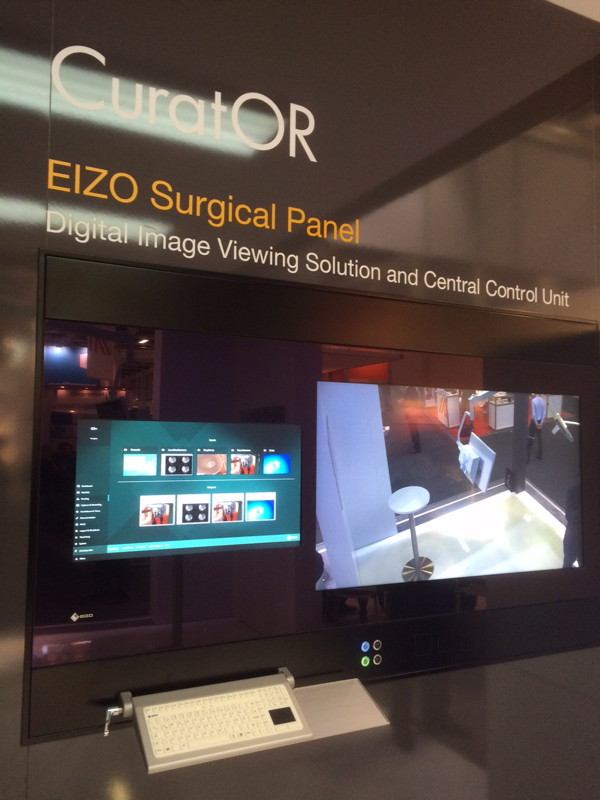JavaFX Real-World application number four is called Caliop. It is the frontend of the CuratOR solution developed by EIZO for operating rooms in hospitals. The frontend runs on wall-mounted consoles and allows the operating team to look up information about a patient, control the routing of various video sources to different monitors, record videos, take photos / stills.
For this software I was asked to implement the UI in JavaFX based on an already very sophisticated HTML mockup. Even though the mockup made heavy use of animations and CSS styling it was a straight forward port to JavaFX.
The following image shows the application in action at a trade show in Germany.
As usual: here are the interview questions and answers.
General Questions
What is the name of your product / project?
CuratOR Caliop
Who are your users / customers?
Clinicians – mainly surgeons and nurses
What is the purpose of your software? What are its benefits?
Facilitation of every day surgical workflows.
Is the application operational? If yes, since when. If not when do you plan to go live?
We plan to go live by the end of 2015.
Development
How did you get the necessary JavaFX Know-How into your team? (Consultants, Internal / External training courses)?
We hired an external developer 🙂
With which version of JavaFX did you start? 1, 2, 8?
Java 8
When did you start developing the application and how long did it take?
November 2014
How many developers worked on it? In total and on the UI.
Two
Why did you choose JavaFX as frontend technology? And very importantly: why did you not choose HTML / Web?
Desktop technology with more options to control and develop on hardware (such as frame grabbers, streamers, video switches etc.). HTML / Web are more usable for mobile technology. Java FX offers very good results with small efforts. JavaFX gives also the offer to write intelligent code keyword data binding.
Was it difficult to convince decision makers to agree on JavaFX?
No
What were the biggest challenges / problems / issues / bugs you faced in the JavaFX part and how did you solve them?
Implementing animations is a whole lot easier in JavaFX than in Swing, but it still takes a lot of skill and dedication.
Which 3rd-party products / frameworks / tools (open source and commercial) did you use and why did you choose them?
FontAwesomeFX, ControlsFX, Afterburner.FX
Did you mix JavaFX and Swing code?
No.
Outlook
Would you use JavaFX again for your next project? Please elaborate why or why not.
Yes at this point just positive reflection from users and developers.
Which features would you like to see being added to JavaFX?
High-level animation support. It should be easy to make menus slide in and out.
Do you plan to provide a mobile version of your application or a mobile addition?
Yes




It would be nice if you also ask JavaFX Real-World Apps creators about testing methods/tools they use and why they decided on them. This whole serie is a good overview of what tools / frameworks are production ready for starting new enterprise project.
[…] additional ‘JavaFX Real-World Apps’ posts that I missed during JavaOne. Firstly, ‘EIZO CuratOR Caliop‘, and secondly, ‘Emirates Airlines Network Capacity […]
[…] additional ‘JavaFX Real-World Apps’ posts that I missed during JavaOne. Firstly, ‘EIZO CuratOR Caliop‘, and secondly, ‘Emirates Airlines Network Capacity […]
[…] JavaFX Real-World Apps: EIZO CuratOR Caliop […]